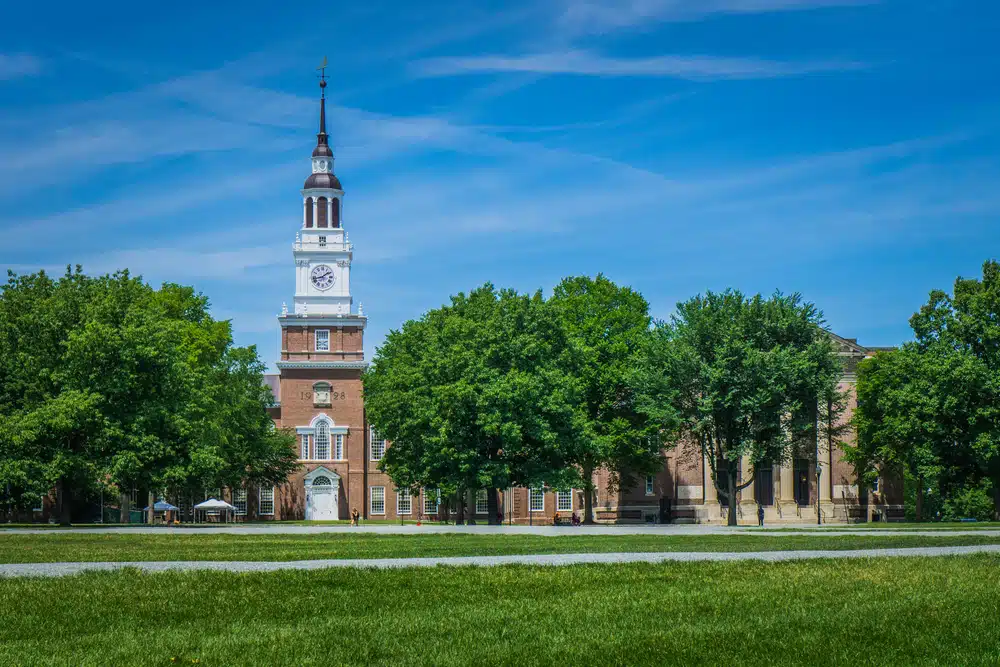What are the Best Majors at Dartmouth?
What are the best majors at Dartmouth? Dartmouth College, a member of the Ivy League, was founded in 1769 in Hanover, New Hampshire. This prestigious institution boasts graduate faculties in arts and sciences, medicine, engineering, and business. Moreover, its undergraduate sector encompasses over forty diverse departments and programs.
Dartmouth is ranked as the ninth oldest educational institution in the U.S. Dartmouth has an extensive off-campus network and 45 faculty-led programs spread across more than 20 countries. Approximately sixty percent of incoming students will engage in at least one of these programs during their Dartmouth journey.
Central to Dartmouth’s academic ethos is its liberal arts foundation, spanning over 40 departments and programs. This emphasis on a liberal arts education is pervasive, intersecting various departments, programs, and academic schools.
Dartmouth students can select from over 60 majors, enhance a major by incorporating courses, or even tailor-make a unique major driven by their interests. Below are some of the best majors offered at Dartmouth College:
Social Sciences
As the leading among 60+ majors offered at Dartmouth, delving into Dartmouth’s Sociology program opens doors to innovative methods of examining subjects, dissecting problems, and understanding the global environment. At its core, sociology teaches the art of analytical thinking, deeply rooted in the liberal arts tradition.
Beyond the conventional sociology major, Dartmouth offers two minors and a customized major. This flexibility caters to students drawn to sociology yet have a primary focus on another domain or those seeking interdisciplinary studies connecting sociology with another field.
Central to its teachings is the emphasis on answering today’s significant societal questions. Many of today’s public policy issues fundamentally revolve around social dynamics. Sociological perspectives offer a multifaceted lens to assess and understand the myriad viewpoints surrounding these challenges.
Engineering
As a Dartmouth engineering student, you’ll cultivate a problem-solving mindset, honing design and hands-on creation skills. Collaborative work is critical, and you’ll benefit from dedicated faculty, workshops, labs, and resource-rich facilities. Embracing hands-on learning, you’ll be poised to create impactful change.

At the heart of Dartmouth’s engineering ethos is the belief that the best engineering solutions converge at the intersection of human-made constructs and the human experience. This human-centric approach to design and the aspiration to better the world resonate in our academic and institutional values.
A Dartmouth-trained engineer is proficient in problem-solving and possesses empathy and drive to address pressing global issues.
Biological Sciences
Embarking on a biology journey at Dartmouth means immersing yourself in diverse disciplines, learning from esteemed faculty, and accessing state-of-the-art facilities. The collaborative spirit is evident as undergraduates, graduates, and professors unite in research spanning lab work, field studies, and impactful publications.
It aims to provide a holistic grasp of biology across environmental, organismal, cellular, and molecular spectrums by introducing students to various biological systems and processes.
Mathematics
Dartmouth’s Mathematics program welcomes both the aspiring mathematician and the curious learner. The curriculum offers flexibility, allowing students to tailor their courses to align with personal interests and ambitions.
Engaging closely with faculty is a cornerstone of the mathematics major, with opportunities ranging from intimate seminars to guided independent research. Students often opt for personalized reading courses alongside regular classes if the existing coursework doesn’t cater to specific interests. Such independent initiatives are heartily discussed and encouraged with departmental advisors.
Art History
Art history is transformative; it compels you to observe with depth and curiosity. It delves into the visual legacies of diverse cultures and timelines. Bridging traditional humanities and the dynamic world of art and performance, art history emphasizes critical analysis, historical contexts, and linguistic adeptness, all while fostering creativity.
Your perspective on art pieces and everyday visual elements will evolve throughout art history. It’s more than just studying past artwork—it’s a unique lens to perceive the world.
Psychology
While psychology is the scientific exploration of behavior, neuroscience delves into the intricacies of the nervous system. As one of the popular majors at Dartmouth, the program aims to understand the mind and behavior, drawing connections to the fundamental psychological processes rooted in brain activities.
How Do You Decide on Your Major?
Deciding on a major at Dartmouth or any other institution can be overwhelming for potential college students. Many, in hindsight, desire a do-over; a survey revealed that 61% of college graduates would change their major if they had another chance.
Yet, not all graduates have regrets about obtaining their degree. Below is a compilation of crucial factors to consider when pinpointing a major, coupled with guidance on choosing the right college after settling on your decision.
Reflect on Your Strengths
Begin by cataloging your achievements and areas of interest. Once done, seek feedback from close family and friends about the traits they associate with you. Often, an external perspective can highlight qualities we overlook or underestimate.
Don’t forget to include topics that have intrigued you but haven’t been deeply explored. Also, recall talents or activities you once excelled in but have since set aside, mainly if it’s been a while.
Explore Potential Careers
With a clear list of your interests and strengths, shift your focus to identifying professions that align with them. For instance, if music resonates with you, possibilities could range from a music teacher to a club promoter or even roles in music-focused nonprofits.

Once you’ve sketched out potential career paths, consider shadowing professionals in those roles to understand the day-to-day experience. If direct observation is challenging, connect with professionals via LinkedIn to set up informational interviews.
Forecast Potential Earnings
Many professions have detailed data available through the Bureau of Labor Statistics. By visiting their site and selecting works that align with your interests, you can gain insights into job opportunities within those sectors.
From your curated list of exciting professions, the site can help you discern which have promising growth trajectories and salaries that match your desired lifestyle. While future earnings shouldn’t be your sole consideration, it’s undoubtedly essential. Being informed can guide how much to invest in your higher education.
Also, envision your post-college aspirations. If they include starting a family, living in a metropolitan area, or extensive travel, you’ll need a profession that financially supports these ambitions.
Evaluate Your Academic Commitment
Not all majors demand the same level of dedication. Assess the effort you’re willing to invest in your education and your desired intensity as a student.
Additionally, investigate if your preferred field requires advanced degrees post-undergrad. Recognizing the need for further education, such as a master’s or professional degree, is crucial when determining your undergraduate path.
What Kind of Students Does Dartmouth Look for?
Dartmouth College, a prestigious member of the Ivy League, ardently fosters an environment of distinction among its students, faculty, and staff.
Dartmouth’s quintessential student is fueled by intellectual zeal and societal inquisitiveness, which propels every facet of their journey. The college beckons driven students from multifaceted backgrounds, offering them a haven steeped in academic prowess and an unwavering bond with the community.
Like several renowned institutions, Dartmouth employs a comprehensive admissions approach, seeking individuals poised to thrive academically. This strategy delves more profoundly than just academic achievements and applications, providing a holistic view of the candidate.
While Dartmouth’s student body boasts varied ethnicities, economic standings, and family dynamics, there’s a predominant alignment of values – ones the institution cherishes and endeavors to embed.
Dartmouth welcomes applications from broad-minded individuals, those committed to realizing their aspirations and maximizing their circumstances. Respect is universal here, but to truly flourish academically and socially, students should be prepared for hard work, demonstrating passion and drive.
Inquisitiveness
This trait holds such a revered place at Dartmouth that “nurturing a sense of wonder and inquisitiveness about our world” prominently features on its admissions webpage. Students are galvanized to explore and formulate original insights while re-evaluating their beliefs. This constant quest for knowledge and personal growth defines the archetypal Dartmouth scholar.

Upholding Values
Dartmouth actively fosters a culture of truthfulness and accountability among its students, staff, and faculty. Throughout their journey at the institution, students are consistently reminded of the significance of staying true to their commitments – to themselves, their peers, and the broader community.
Quest for Discovery
At Dartmouth, a simple fascination with the world isn’t enough; students are urged to embrace a profound sense of wonder. A testament to this is that over half of Dartmouth’s students engage in at least one international study experience during their tenure. Off-campus study programs form a vital pillar of the Dartmouth educational philosophy.
Those at Dartmouth are celebrated for their zest for exploration, making a zeal for adventure a perfect match for the campus culture. Even in their inaugural year, students can dive into local expeditions curated by their advanced peers.
Commitment to Community
It’s a well-acknowledged fact that Dartmouth students possess an innate drive for collaboration and open dialogue, both within and outside the campus confines. This stems from the institution’s core values, championing respectful discourse and collective efforts. During their time at Dartmouth, students are constantly propelled to acknowledge and act upon their responsibilities to the larger world around them.
Suppose you need help choosing among the best majors at Dartmouth or help putting the finishing touches on your college applications at AdmissionSight. In that case, we have over ten years of experience guiding students through competitive admissions.
AdmissionSight can help you put your best foot forward when applying to college this fall. Contact us today for more information on our services.





































